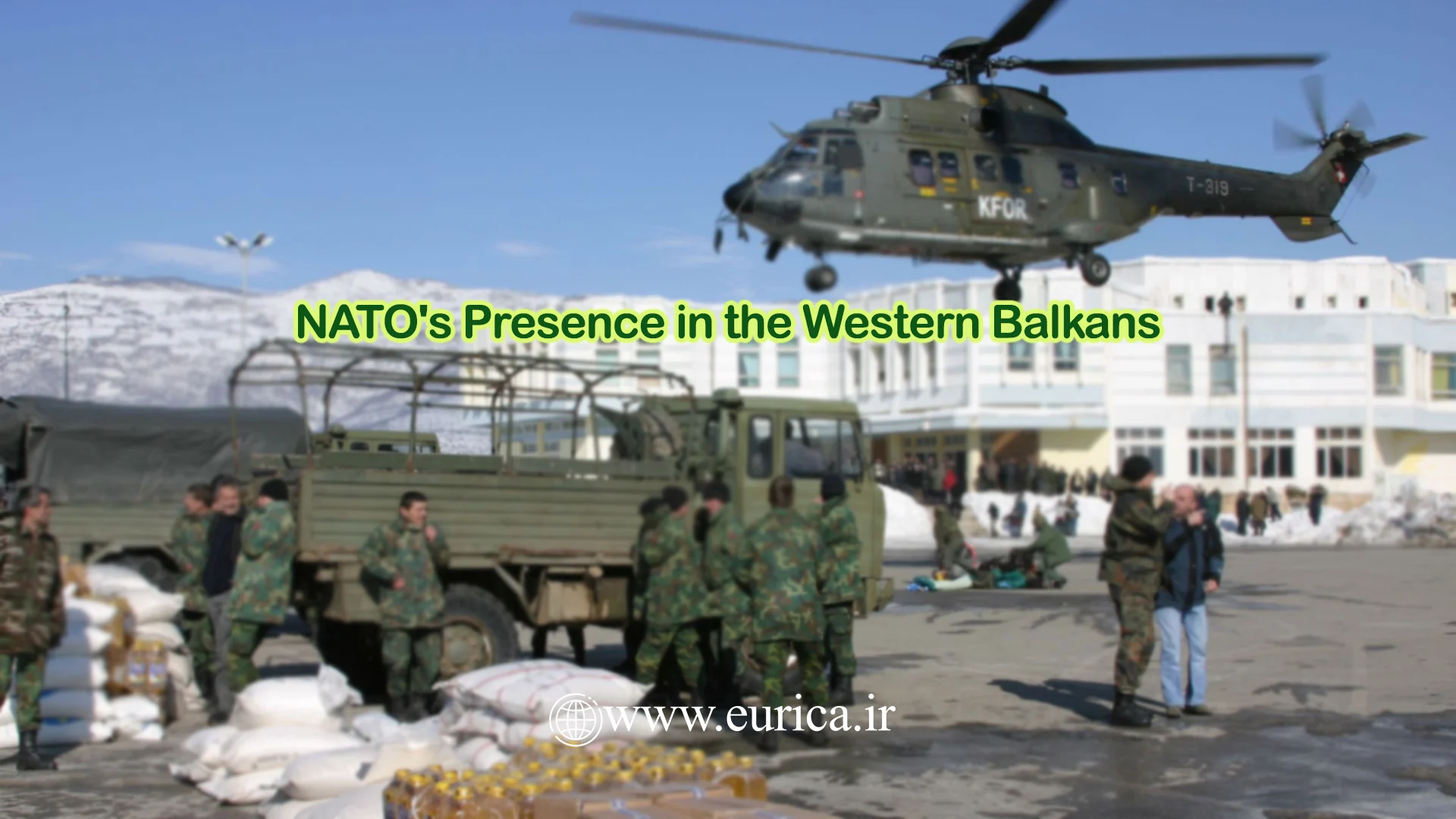Introduction
An Examination of NATO’s Presence in the Western Balkans
May 22, 2025
Introduction
The Western Balkans have long been among the most challenging and complex regions of interest for NATO. This area comprises NATO members (Albania, Montenegro, and North Macedonia), NATO partners (Bosnia and Herzegovina), and militarily neutral countries (Serbia). The region’s intricate political, ethnic, and religious dynamics have necessitated NATO’s continuous presence since the 1990s, focusing on the security and defense conditions of these countries and supporting their integration into the Alliance. The prevailing circumstances in this region directly impact the Alliance’s security, making the maintenance of stability and peace a key objective for NATO.
NATO’s Relations with Western Balkan Countries
The term “Western Balkans” refers to Albania, Bosnia and Herzegovina, North Macedonia, Montenegro, and Serbia. Given that one of NATO’s primary deterrence and collective defense components is its presence in the eastern part of its territory, the Alliance has maintained a continuous and serious presence in the Western Balkans since the 1990s. Through this presence, NATO has endeavored to align these countries with its standards and facilitate their path to membership. In recent years, NATO has also established multinational battlegroups in Bulgaria, Estonia, Hungary, Latvia, Lithuania, Poland, Romania, and Slovakia, enhancing its presence in the eastern territory and encouraging some Western Balkan countries to participate in these battlegroups. To further bolster security and stability in the eastern territory, NATO has deployed additional ships and aircraft to the region and announced plans to integrate its military presence in the Balkans with a strengthened political role by 2030.
Among the Western Balkan countries, Albania, Montenegro, and North Macedonia joined NATO in 2009, 2017, and 2020, respectively. Bosnia and Herzegovina has not yet attained NATO membership, while Serbia is fundamentally not pursuing membership. However, the absence of NATO membership does not imply a lack of cooperation with the Alliance. Each country’s cooperation with NATO serves different purposes: Bosnia and Herzegovina collaborates with the hope of joining the Alliance, whereas Serbia, adhering to a policy of military neutrality, does not seek membership. NATO maintains its presence in the region through various means, including involving Western Balkan countries in its joint operations, accepting their membership, and engaging in bilateral cooperation. Deterrence and defense, crisis management, and cooperative security are the primary areas of NATO’s collaboration with Western Balkan countries.
NATO Forces, Offices, Bases, and Deployment in the Balkans
Despite NATO’s continuous cooperation with regional countries since the 1990s, the Alliance currently has official offices only in Belgrade and Sarajevo. This does not mean that NATO lacked a physical presence in other regional countries in the past. Research indicates that NATO had official offices in Tirana, Skopje, and Podgorica before Albania, North Macedonia, and Montenegro joined the Alliance. However, following these countries’ accession to NATO, the offices ceased operations, having fulfilled their missions by implementing necessary reforms and providing adequate support to the host countries. For instance, the NATO office in Skopje closed in March 2021, a year after North Macedonia’s NATO membership, and the office in Tirana became inactive in June 2010 following Albania’s full accession.
Currently, NATO maintains an active official office in Serbia. Established in 2006 as the NATO Military Liaison Office in Belgrade, it is currently headed by Italian General Pier Luigi Lodola. This office supports military reforms in Belgrade, facilitates Serbian participation in the “Partnership for Peace” program, and assists in NATO’s public diplomacy activities in the Balkan region.
To facilitate cooperation with Bosnia and Herzegovina, NATO also has an official headquarters in Sarajevo, led by U.S. General Matthew E. Wallace, with military and civilian staff from member countries, including Hungary and Turkey. The Sarajevo headquarters has two main missions: assisting Bosnian authorities in implementing security and defense sector reforms and fulfilling obligations related to the Partnership for Peace program, and providing logistical and other support to EUFOR in Bosnia and Herzegovina under the Berlin Plus agreement. The primary objectives pursued by NATO’s Sarajevo headquarters include enhancing transparency and civilian oversight of Bosnia and Herzegovina’s armed forces, improving personnel training, fully integrating women into military and security policies and operations, advising on capacity and equipment development, assisting in budget, logistics, and procurement development, expanding crisis and emergency management capacities, responding to crises, and increasing the armed forces’ readiness for cooperation with NATO and other partner countries, including Serbia and Ireland, to address regional and global security challenges such as organized crime and misinformation.
Since 1999, NATO has deployed a significant number of military and civilian personnel in Kosovo under the “Kosovo Force” (KFOR) mission. As of February 2025, KFOR comprises approximately 4,686 troops from 29 contributing nations, with Italy providing the largest contingent of 1,258 soldiers, followed by the United States with 602 troops.
Detailed information on the exact number of NATO forces in each regional country is currently unavailable.
Nature of NATO Offices and Bases Activities in the Balkans
NATO’s official offices in the Balkans have consistently pursued several fundamental objectives. The primary goal has been to assist host countries in implementing security and defense sector reforms and fulfilling related commitments. Other objectives include providing logistical and other support for ongoing projects in the host country, enhancing the effectiveness and development of defense capabilities, including the Ministry of Defense, Ministry of Security, and armed forces, coordinating bilateral activities (training, financial, and advisory) of NATO allies in the host country, and engaging with academic figures and students from host countries.
Each of these representative offices, comprising several senior military figures and military and civilian personnel, is tasked with persuading host countries aspiring to NATO membership to align their security and defense sectors with NATO standards. These NATO representations also assist host countries in facilitating and accelerating their path to NATO membership. Promoting women’s participation in society and improving the daily lives of people are other focal points of NATO offices’ activities in the region. These offices also contribute to NATO’s public diplomacy efforts in the Balkans. Overall, the aim of NATO offices in the region, whether in aspiring member countries or neutral states, is to gather sufficient information on the host country’s security and defense status, strengthen cooperation between these countries and NATO and its partners, and bring the host countries’ security and defense sectors closer to NATO’s desired standards.
Key NATO Missions in the Balkans
According to NATO’s official website, the Alliance currently has four operations and missions in the Western Balkans.
Kosovo Force (KFOR): The most significant NATO-led military operation in the Western Balkans, KFOR aims to support international efforts to establish peace and stability in Kosovo. Since 1999, NATO has deployed a substantial number of military and civilian personnel in Kosovo under this mission. As of February 2025, approximately 4,686 troops from 29 contributing nations are part of KFOR, with Italy providing the largest contingent.
Air Policing Operations: NATO conducts air policing missions in Montenegro, Albania, and North Macedonia. These multinational operations are key NATO activities during peacetime, aiming to protect the safety and integrity of Allied airspace. Fighter aircraft and their crews are on standby 24/7 throughout the year. All aircraft flying in or near NATO airspace are identified and tracked. Albania, Montenegro, and North Macedonia benefit from NATO’s air protection under this operation, which is a significant advantage for these countries. Greek and Italian forces are responsible for safeguarding the airspace of these three NATO members in the Western Balkans.
Multinational Battlegroups: Some Western Balkan countries, such as Albania and North Macedonia, collaborate with NATO’s multinational battlegroups. Although these battlegroups are not stationed in the Western Balkans, several of their bases are located in neighboring countries like Romania, Bulgaria, and Hungary. Given that some regional countries have engaged with these battlegroups, their relevance is noteworthy.
Analysis and Evaluation
Most Western Balkan countries have joined NATO over the past two decades, while their accession to the European Union still faces significant obstacles. By adopting an open-door policy toward this region and participating in security, military, and civilian reforms in Western Balkan countries, NATO has successfully established its presence in these nations. NATO members in the Western Balkans show a strong willingness to participate in the Alliance’s operations and missions. Even non-member countries like Serbia and Bosnia and Herzegovina are eager to engage in NATO missions worldwide.
Studies indicate that NATO’s presence in the region is hybrid, addressing both military and civilian aspects of security in collaboration with Western Balkan partners. The Alliance has adopted a deterrence and stability-focused approach toward the region. Interestingly, the projects and programs designed by NATO have addressed nearly all dimensions of security. From the smallest aspects—such as promoting the presence of women in the defense sector, improving public life, and addressing cyber threats—to the highest levels, including army modernization, training of armed forces, and ammunition destruction, these initiatives have been taken into account.
This comprehensive approach has enabled NATO to gain awareness of virtually all layers of security in Western Balkan countries and to become an influential actor in their security and defense reform processes.
Given the regional countries’ willingness to cooperate with NATO through these projects, it can be said that NATO’s presence in the Western Balkans is on an expansionary trajectory—one that is likely to continue in the coming decades.




